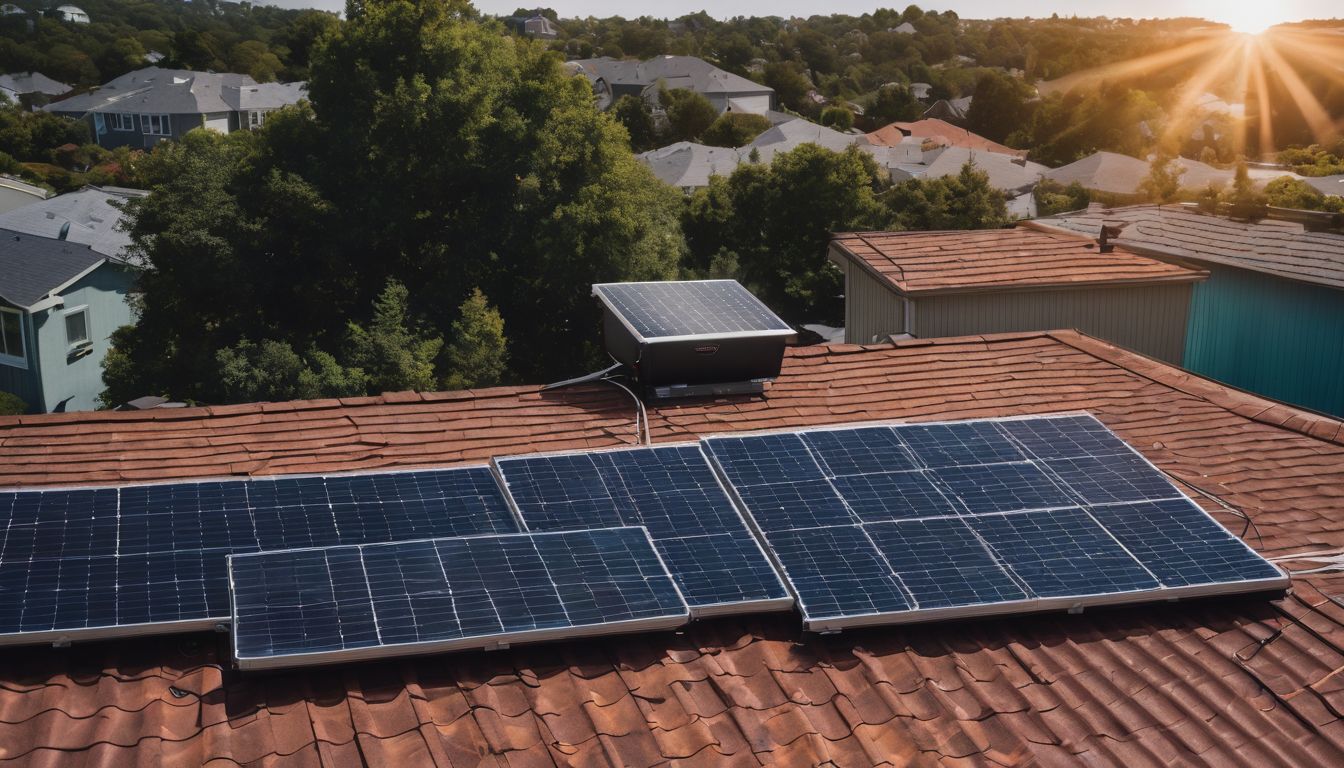 Rising energy bills and climate change are big worries for many of us today. Solar energy is now one of the fastest-growing sources of new electricity worldwide. This article will shine a light on how harnessing the sun’s power can lead to greener living and lower costs.
Rising energy bills and climate change are big worries for many of us today. Solar energy is now one of the fastest-growing sources of new electricity worldwide. This article will shine a light on how harnessing the sun’s power can lead to greener living and lower costs.
Let’s discover solar, the bright choice for our future!
Key Takeaways
- Solar panels made of photovoltaic cells convert sunlight into clean electricity without harming the environment, helping to cut energy bills and reduce reliance on fossil fuels.
- The cost of solar energy is falling, making it more accessible for homes and businesses, while also boosting job opportunities in a growing industry that contributes to economic growth.
- As a renewable power source, solar energy significantly lowers greenhouse gas emissions contributing to climate change mitigation and providing an inexhaustible supply of electricity.
- Advancements in solar technology continue to improve efficiency and affordability, signaling strong potential for widespread adoption in future sustainable living practices.
- By harnessing solar power, individuals can play a direct role in promoting environmental sustainability and participate in creating a cleaner, healthier planet.
What is Solar Energy?
Solar energy is a sustainable and renewable source of power obtained from the sun using photovoltaic cells, providing heat and light without emitting greenhouse gases. Its increasing global demand and decreasing costs have led to employment opportunities in the industry.
Obtaining solar energy
Harnessing the power of the sun starts with solar panels, which are made up of photovoltaic cells. These cells transform sunlight directly into electricity without any harmful emissions or noise.
They can be installed on rooftops or in large fields known as solar farms. The energy captured is clean and sustainable, contributing to reducing our carbon footprint.
To maximise their effectiveness, these panels must face towards the sun and should be kept clear from shade or debris. Homes and businesses around the world use this technology to generate their own power, cutting down on energy bills and dependance on fossil fuels.
With advances in photovoltaic technology, capturing solar energy has become more efficient than ever before.
Providing heat and light
Solar energy plays a crucial role in providing heat and light through the use of solar panels to capture sunlight and convert it into electricity. This renewable energy source directly harnesses the sun’s rays, producing clean power without emitting harmful greenhouse gases.
By utilising solar energy for heating water and powering lighting systems, individuals can significantly reduce their carbon footprint while also cutting down on utility bills. Solar power benefits both the environment and personal finances, making it a sustainable choice for eco-friendly living.
Furthermore, solar energy offers an efficient way to meet everyday heating and lighting needs while promoting environmental sustainability. Harnessing the power of sunlight also contributes to lowering reliance on traditional fossil fuels, thereby supporting efforts to combat climate change by reducing carbon emissions.
Sustainable and renewable
Solar energy is sustainable and renewable, making it a crucial part of environmentally friendly living. By harnessing the power of sunlight, solar panels produce clean electricity without depleting natural resources or emitting harmful greenhouse gases.
This means that solar energy can be continually replenished and used without causing harm to the planet, providing an eco-friendly and long-term solution for powering homes and businesses.
The renewable nature of solar energy also makes it an essential component in reducing carbon footprints and combating climate change. As more individuals and communities embrace this sustainable power source, they contribute to a cleaner and more sustainable future for generations to come.
Benefits for the environment
Solar energy offers numerous benefits for the environment. By harnessing sunlight to generate electricity, solar power significantly reduces greenhouse gas emissions, mitigating the impact of climate change.
Additionally, solar energy is a clean and renewable source of power that helps in promoting energy sustainability by reducing our reliance on fossil fuels and contributing to a lower carbon footprint.
Furthermore, the use of solar panels minimises air pollution and water usage associated with traditional forms of electricity generation. Embracing solar energy can lead to a greener future by preserving natural resources and promoting eco-friendly practices while supporting conservation efforts.
The Growing Influence of Solar Energy
As global demand for solar energy increases and costs decrease, there are also growing employment opportunities in the solar industry. Learn more about the expanding influence of solar energy in sustainable living by reading on.
Increasing global demand
Demand for solar energy is steadily rising worldwide. This surge in demand is driven by the growing awareness of the environmental impact of traditional energy sources. As more countries commit to reducing their carbon footprint, the adoption of solar energy continues to increase.
The increasing global demand for solar panels and related technologies has led to significant advancements in efficiency and cost reduction, making it an attractive option for both residential and commercial use.
Solar power is now being seen as a viable alternative to conventional electricity generation, offering a sustainable and eco-friendly solution that aligns with the goals of climate change mitigation and energy efficiency.
Decreasing costs
Solar energy costs have been decreasing significantly, making it an increasingly affordable option for households and businesses. This trend has made solar power accessible to a wider range of people, driving the adoption of clean and sustainable energy solutions.
As technology continues to advance and economies of scale come into play, the cost reduction in solar energy is paving the way for a greener future while offering economic benefits as well.
The reduced costs associated with solar energy installation have led to an increase in its use across various sectors, thereby contributing towards environmental conservation efforts and reducing carbon footprints.
Employment opportunities
The growing demand for solar energy is creating a range of employment opportunities within the industry. From manufacturing and installation to maintenance and research, there are diverse roles available for individuals passionate about clean energy.
As the sector continues to expand, so do career prospects in solar technology, providing a chance to contribute directly to environmental conservation efforts.
Advancing solar technology offers potential for new job creation across various skill sets, from engineering and project management to sales and marketing. Embracing green energy not only benefits the environment but also opens up avenues for meaningful careers in sustainability-focused industries.
The rise of solar power presents an exciting opportunity for environmentally conscious individuals seeking impactful work while making a positive contribution to sustainable living.
Advantages of Solar Energy
Solar energy offers a range of benefits, from mitigating climate change to creating new job opportunities in the renewable energy sector. Its inexhaustible and non-contaminating nature makes it a competitive and sustainable alternative to traditional energy sources.
Climate change mitigation
Solar energy plays a vital role in climate change mitigation. By utilising solar power, we can significantly reduce our reliance on fossil fuels, thus lowering carbon emissions and decreasing our overall carbon footprint.
This contributes to the global effort to combat climate change and its adverse effects on the environment.
Harnessing solar energy for electricity and heating diminishes the demand for non-renewable energy sources, resulting in reduced greenhouse gas emissions. The shift towards solar power is fundamental in promoting sustainable living and ensuring a greener future for generations to come.
Inexhaustible and non-contaminating
Transitioning from the pivotal role of solar energy in climate change mitigation, it is worth noting that solar power is inexhaustible and non-contaminating. The sun’s energy is an abundant resource, offering a continuous and sustainable source of power with no risk of depletion.
Unlike fossil fuels, harnessing solar energy does not produce greenhouse gas emissions or air pollutants that contribute to climate change or harm human health. By tapping into this clean and renewable energy source, individuals can significantly reduce their carbon footprint while positively impacting the environment.
Solar energy’s potential lies in its ability to provide an unlimited and clean source of power, making it an essential component of sustainable living. Harnessing the sun’s boundless energy can lead to decreased reliance on finite resources and pave the way for a greener future with reduced environmental impact.
Competitive and job-creating
Transitioning from the inexhaustible and non-contaminating nature of solar energy, it is important to recognise its competitive edge and job-creating potential. As the demand for renewable energy sources continues to rise, the solar industry presents numerous employment opportunities in installation, maintenance, research, and development.
Furthermore, the growing competition within this sector fosters innovation and drives down costs, making solar energy an attractive option for individuals seeking sustainable careers while significantly reducing their carbon footprint.
The Future of Solar Energy in Sustainable Living
The future of solar energy in sustainable living holds immense potential for further growth and development. As technology continues to advance and costs decrease, solar energy has the capability to revolutionise how we power our homes and communities in a more eco-friendly way.
Potential for further growth
Solar energy has the potential for further growth, as technological advancements continue to enhance its efficiency and affordability. The increasing global demand for eco-friendly energy sources is driving research and development in solar power, leading to innovative solutions that make it more accessible to individuals and communities.
This growth presents exciting opportunities for job creation in the renewable energy sector, contributing to a sustainable economy while reducing carbon footprints.
Revolutionising sustainable living, solar energy offers a promising future by providing an inexhaustible and non-contaminating source of power. As costs decrease and awareness of environmental benefits grows, there is tremendous potential for wider adoption of solar technology in homes, businesses, and public infrastructure worldwide.
Revolutionizing sustainable living
Solar energy is revolutionising sustainable living by providing an eco-friendly alternative to traditional energy sources. Its inexhaustible and non-contaminating nature makes it a key player in reducing carbon footprints.
Solar power allows individuals to significantly lower their reliance on fossil fuels, thus mitigating the impacts of climate change.
Furthermore, solar energy offers competitive advantages that create new job opportunities for a greener economy. The potential for further growth in solar technology promises to transform the way people live, making sustainable living more attainable and impactful for future generations.
Conclusion
In conclusion, solar energy plays a crucial role in sustainable living by reducing carbon footprint and promoting eco-friendly energy. Its inexhaustible and non-contaminating nature contributes to climate change mitigation and job creation.
With increasing global demand and decreasing costs, solar energy is revolutionising sustainable living and offering ample employment opportunities. Embracing solar energy will propel us towards a more environmentally conscious future while supporting conservation efforts.
FAQs
1. What is sustainable living and how does solar energy contribute to it?
Sustainable living means making choices that reduce our impact on the planet, and using solar energy helps by providing ecofriendly energy without harming the environment.
2. Can switching to solar energy really help reduce my carbon footprint?
Absolutely! Solar energy is a clean alternative to fossil fuels, so when you use it for your home or business, you’re cutting down on carbon emissions significantly.
3. Are there other advantages of using solar energy besides being good for the planet?
Yes, aside from helping with carbon footprint reduction, solar energy can save you money on electricity bills and increase the value of your property.
4. Is solar power a reliable form of alternative energy?
Definitely! Solar power is not only a reliable source of alternative energy but also consistently available during daylight hours, making it a dependable part of an ecofriendly lifestyle.





